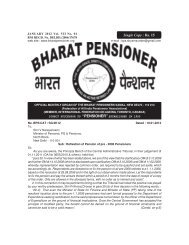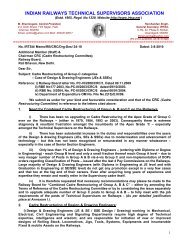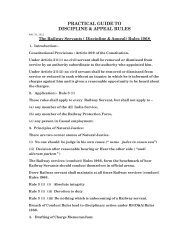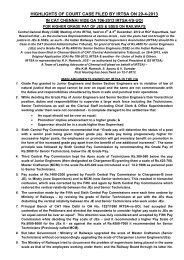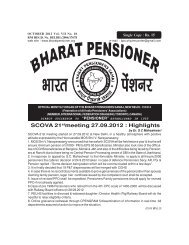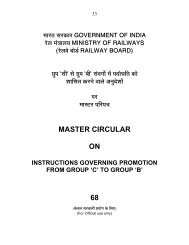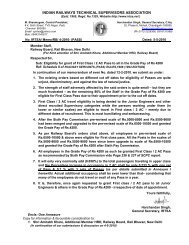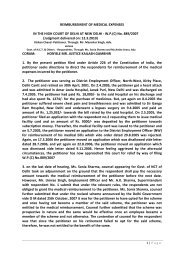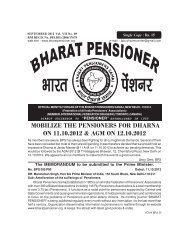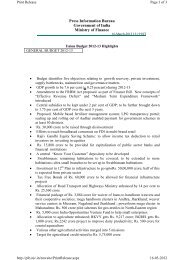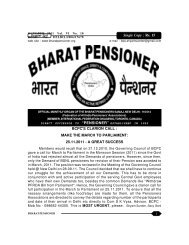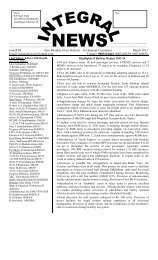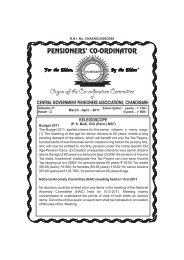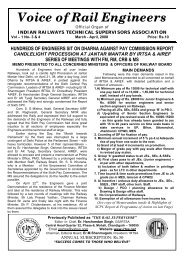INDIAN RAILWAYS TECHNICAL SUPERVISORS ... - Irtsa.net
INDIAN RAILWAYS TECHNICAL SUPERVISORS ... - Irtsa.net
INDIAN RAILWAYS TECHNICAL SUPERVISORS ... - Irtsa.net
You also want an ePaper? Increase the reach of your titles
YUMPU automatically turns print PDFs into web optimized ePapers that Google loves.
<strong>INDIAN</strong> <strong>RAILWAYS</strong> <strong>TECHNICAL</strong> <strong>SUPERVISORS</strong> ASSOCIATION<br />
“In pursuit of justice for Rail Engineers since 1965”<br />
(Estd. 1965, Regd. No.1329, Website http://www.irtsa.<strong>net</strong>)<br />
M. Shanmugam, Central President,<br />
# 4, Sixth Street, TVS Nagar, Chennai- 600050.<br />
Email- cpirtsa@yahoo.com<br />
Mob: 09443140817<br />
Harchandan Singh, General Secretary,<br />
C.Hq. 32, Phase 6, Mohali, Chandigarh-160055.<br />
Email-gsirtsa@yahoo.com<br />
(Ph:0172-2228306, 9316131598).<br />
No:IRTSA/Memorandum/17-2011 Date: 30.6.2011<br />
1. Dr. Manmohan Singh, Hon’ble Prime Minister of India, PMO, South Block, New Delhi.<br />
2. Dr. Manmohan Singh, Hon’ble Minister for Railways, Rail Bhavan, New Delhi.<br />
Subject: Grant of Grade Pay of Rs.5400 in PB-3 to Senior Section Engineers (SSE) & Grade<br />
Pay of Rs.4800 in PB-2 to Junior Engineers (JE) on Indian Railways - Request for<br />
kind intervention.<br />
Reference:-i) Gazette notification No.470, Ministry of Finance G.S.R. 622(E) dated 29-8- 2008<br />
ii) Railway Service (Revised Pay) Rules, 2008 (RBE 103, RBE 108, RBE 124)<br />
1. It is a matter of pride & privilege of the Indian Railways that you have personally taken over as<br />
the additional charge of the Railways. We take this opportunity to place before you a case of<br />
serious injustice done with the Technical Supervisors - Senior Section Engineers (SSE) & Junior<br />
Engineers (JE) on Indian Railways.<br />
2. Technical Supervisors or the Supervising Engineers (JE, SSE) of Indian Railways, are the back<br />
bone of the Railway system and are being denied of their justifiable pay scales. Higher duties,<br />
responsibilities and accountability that are directly linked to the safe operation of trains &<br />
performance of Railways were not considered while deciding their pay scales. Common bunching<br />
of pay scales equated their pay scales with the categories working under them disturbing the<br />
vertical parity. Pay scales of categories, which were in the lower pay scales, were given upgradation<br />
and even placed two scales above Technical Supervisors disturbing the horizontal<br />
parity. The category that was given exclusive higher pay scale among all Group-C employees<br />
was given humiliatingly lower pay scales than the categories which do not shoulder as much<br />
responsibilities like them.<br />
3. It is regretted that even the recommendations of the Departmental Anomalies Committee and<br />
Priority Committee of Ministry of Railways, regarding upgrading the Grade Pay of Senior Section<br />
Engineers & Junior Engineers of Indian Railways made as long back as in 2009, to the Ministry of<br />
Finance, had not so far been accepted by the by the Ministry of Finance. Had that been done, that<br />
would have removed the anomaly at least partially.<br />
4. Nearly every infrastructure created on Indian Railways is a direct result of some form of<br />
Engineering. It ensures the countrymen with essentials required to meet their transportation<br />
needs. Without it, country would never have moved forward. It is the engineering which makes<br />
the Indian Railways to progress and prosper. Engineers have constructed the Indian Railways,<br />
which offers one of the cheapest and safest transport system compared to any transport system<br />
in the world. On Indian Railways system - buildings, tracks, bridges, motive powers, rolling<br />
stocks, Signal & telecommunication, traction & distribution etc and every brick of it are built and<br />
maintained by the Engineers.<br />
5. 3500 Group “A” Officers, 2500 Group “B” officers and 70000 Group “C” Supervising Engineers /<br />
Technical Supervisors are directly getting the work executed from 9.2 lakh technical workers out<br />
of 13.2 lakhs Railway employees. This engineering family is the one direct force in making the<br />
system work day and night 24 hours on all 365 days of the year. Presently these Engineers –<br />
especially those in Group “C” are totally frustrated and demoralized.<br />
6. It is unfortunate that both Fifth and Sixth Pay Commissions have underestimated the significant<br />
and sensitiveness of the work-content of the Engineers, their responsibility and accountability in<br />
the system reversing the recognition given by the Third and Fourth CPC.. Many truthful situations<br />
went out of sight of both these Pay Commissions which placed the Technical Supervisors on par<br />
with the supporting non-technical staff or rather placed the Grade Pay of JEs & SSEs even below<br />
the supporting staffs thus disturbing the existing relativity and hierarchy (as apparent from<br />
Annexure III attached herewith).<br />
1
7. The Technical Supervisors or the Supervising Engineers (JE, SSE) on the Railways have lost<br />
their status resulting in total frustration and mental agony. Even though there are several other<br />
issues as well which need to be settled early, but we bring to your kind notice only the issue of<br />
Grade Pay which needs to be addressed as means of damage control exercise – (keeping in<br />
view the detailed justification submitted in Annexure I, II & III attached herewith).<br />
8. It is, therefore, requested that keeping in view the above submissions:<br />
a) Grade Pay of Rs.5400 in PB-3 may please be granted to the Senior Section<br />
Engineers (SSE) on the Railways; and<br />
b) Grade Pay of Rs.4800 in PB-2 may please be granted to the Junior Engineers (JE)<br />
on the Railways.<br />
Yours faithfully,<br />
Encl: Detailed Justification in 3 Annexure<br />
(Harchandan Singh),<br />
General Secretary, IRTSA<br />
Copy for information and favourable consideration to:<br />
i) Shri Pranab Mukherjee, Hon’ble Minister of Finance, Government of India, North Block, New Delhi.<br />
- In continuation of our Memorandum No: IRTSA /Memo/ 11-2011 Date: 2-5-2011<br />
ii) Chairman, Railway Board, Rail Bhawan, New Delhi;<br />
iii) Member Staff, Railway Board, Rail Bhawan, New Delhi<br />
2
Annexure-I<br />
JUSTIFICATION FOR REVISION OF GRADE PAY OF <strong>TECHNICAL</strong> <strong>SUPERVISORS</strong><br />
Regarding: Grant of Grade Pay of Rs.5400 in PB-3 to Senior Section Engineers (SSE) & Grade Pay<br />
of Rs.4800 in PB-2 to Junior Engineers (JE) on Indian Railways.<br />
Reference:- i) Gazette notification No.470, Ministry of Finance G.S.R. 622(E) dated 29-8-2008<br />
ii) Railway Service (Revised Pay) Rules, 2008 (RBE 103, RBE 108, RBE 124)<br />
1. Technical Supervisors, shoulder the direct responsibilities of safe, efficient & ‘Failure-proof’<br />
production, repair, maintenance and operation of Rolling Stock, Locomotives, P-Way, Works, Bridges,<br />
Signal & Telecommunication Systems, Overhead Equipments (OHE) and other assets and equipment on<br />
the Railways. Reduced manpower, introduction of large number of new trains, addition of new assets and<br />
introduction of new & modern technologies etc have substantially added to their duties and responsibilities<br />
over the years. Other departments provide only necessary support to them to enable them to discharge<br />
their functions.<br />
2. It is unfortunate that both 5th and 6th Pay Commissions had under-estimated the significance and<br />
sensitiveness of the work-content of the Rail Engineers, their responsibility and accountability in the<br />
system. Many straightforward situations like ‘higher professional qualifications’, ‘longer training<br />
period’ & ‘greater responsibilities’ as well accountability towards public safety and efficiency of the<br />
Railways went out of sight of both these Pay Commissions.<br />
3. The 5th and 6th Pay Commissions had placed The Technical Supervisors on par with the<br />
supporting non-technical staff or rather below the supporting staff with respect of pay scales thus disturbing<br />
the existing relativity and hierarchy (as apparent from Annexure III attached herewith).<br />
4. The categories like Accounts, Teachers and Nurses who were in the lower pay scales were given<br />
up-gradation and were placed even two grades higher than Technical Supervisors. Worse and even more<br />
humiliating is the fact that the pay of categories, which work under the Technical Supervisors, were also<br />
equated with them - undermining the Supreme Court judgment of “the supervisor’s pay cannot be equal<br />
to the person being supervised”.<br />
5. Indian Railways has been continuously upgrading its technology in train operations and<br />
maintenance. For this purpose continuous induction of new technology is resorted to and improvements are<br />
being made in the existing technology. The Technical Supervisors being the first level of management,<br />
control the field and have to update their knowledge and skills and to acquire new ones to adapt to new<br />
technology and not only guide / train the staff working under their control for safe and efficient induction of<br />
new technologies but also to effect the working.<br />
6. If the Grade Pay of this vital category of Technical Supervisors, which is having direct<br />
responsibility for safe and efficient running of trains, are kept lower than that of the categories like Accounts<br />
Staff - which are having supportive roles - it is bound to adversely affect their efficiency and in turn that of<br />
the Railways. Continuous erosion of their real wages, lack of adequate avenues of promotion and nonredressal<br />
of their genuine problems. This humiliation needs to be removed early.<br />
7. Factors contributing to the perpetration of injustice with the Rail Engineers / Technical<br />
Supervisors on the Railways:<br />
i) Higher recruitment qualification, longer initial training, higher responsibilities shouldered by these<br />
categories in the core activity of Railways have been ignored by the 6th Pay Commission & the<br />
Government while deciding the Grade Pay of Technical Supervisors (Junior Engineers & Senior<br />
Section Engineer on the Railways) - (Details submitted in Annexure I-A ).<br />
ii) Existing relativity has been disturbed vis-à-vis Accounts Staff & Para-Medical (Nursing Cadre) in<br />
spite of higher qualifications and longer period of training and intensive job requirements –<br />
involving public safety and efficiency of the Railways. - (Table submitted in Annexure I-B).<br />
iii) Fifth CPC had denied application of multiple factor of 3.25 only to S-13 scale. If the same<br />
common multiple factor of 3.25 was applied by the Fifth CPC to the scale of SSE (S-13), they<br />
should have been given the Pay Scale of Rs.8000-13500 by the Fifth CPC and consequently their<br />
grade pay should have been Rs.5400 after the Sixth CPC.<br />
iv) Ratio between Minimum Pay of Group “D” to Minimum Pay of Senior Section Engineers had<br />
fallen from 4.28 after Third Pay Commission to only 2.63 after Sixth CPC.<br />
3
v) Junior Engineers have at present unjustly been given the same Grade Pay of Rs.4200 at par with<br />
Master Craftsman / Senior Technicians – even though they supervise the MCM (Master<br />
Craftsman / Senior Technicians). This has greatly disturbed the vertical relativity in the cadre<br />
hierarchy and violated the law of natural justice by equating the Supervisor with the Supervised<br />
and placing the feeder and promotional posts in the same pay scale.<br />
vi) Increase in Duties & responsibilities of Technical Supervisors due to modernization, introduction<br />
of high speed trains & numerous other factors have all been ignored. Including technological<br />
advancements in Railway Engineering, greater application of sophisticated skill, safety & intensive<br />
supervision by the Technical Supervisors on the Railways for production, repair and maintenance<br />
of Locos, Coaches, Wagons, Signaling, P-Way, Works and Bridges etc.<br />
vii) Multifaceted duties & responsibilities, stringent punishments for any shortcomings, tough<br />
selection procedure - which requires knowledge in all the fields of Railways - were not considered.<br />
viii) While for other categories the work has eased due to modernization, the duties and<br />
responsibilities of the Technical Supervisors had increased manifold.<br />
8. It is extremely painful that not even the barest minimum concern was shown by anybody in<br />
deciding the pay of JEs and SSEs who perform the highly responsible duty in the core activities of Indian<br />
Railways. The uncared attitude of Railways/Government has created severe heartburn among this category<br />
which needs to be addressed immediately.<br />
9. It is, therefore, requested that:<br />
a. Senior Section Engineers in Grade Pay of Rs.4600 may please be granted the<br />
Grade Pay of Rs.5400 in PB-3 and<br />
b. Junior Engineers in the Grade Pay of Rs.4200 may please be granted the Grade<br />
Pay of Rs.4800 in PB-2.<br />
4
Annexure II<br />
RECRUITMENT, QUALIFICATIONS, TRAINING, DUTIES & RESPONSIBILITIES<br />
- <strong>TECHNICAL</strong> <strong>SUPERVISORS</strong> ON <strong>RAILWAYS</strong><br />
1. RECRUITMENT, QUALIFICATIONS AND TRAINING<br />
A. Junior Engineers (in Grade pay of Rs.4200)<br />
i) 50% posts of JEs (Junior Engineers) in the Grade pay of Rs.4200 are filled up by direct<br />
recruitment through Railway Recruitment Boards - with Diploma in (Mechanical / Electrical /<br />
Civil / Electronics) Engineering as qualifications. They are further given intensive practical &<br />
theoretical training for 1½ year (18 months) in Systems Technical Schools & Training Centers<br />
with practical training in Workshops, Sheds, Depots and Production Units etc.<br />
ii) 25% are promoted from Senior Technicians having long years of practical experience after<br />
passing a positive selection (including a written test and interview).<br />
Iii) 25% are selected as “Intermediate Apprentices” from more qualified and experienced<br />
Technicians through Limited Departmental Selection and given a further training of 1½ years in<br />
System Technical Schools and Workshops / Sheds and Depots including four theoretical and<br />
practical sessions etc.<br />
B. Senior Section Engineers (in the Grade pay of Rs.4600): 20% of posts of Section Engineers<br />
now merged with Senior Section Engineers in the present Grade pay of Rs.4600 are filled by<br />
Direct recruitment of Engineering Degree Holders.<br />
Induction of Graduate Engineers only to demoralize the young and talented<br />
Graduate Engineers inducted in Railways as SSE, after stringent selection and scrupulous<br />
training in Railway working system.<br />
They have the highest entry qualification in the entire Government Group-C cadres.<br />
Undergoes one year on the job training.<br />
SSE are trained not only in respective field but also in other Technical fields besides<br />
Establishment & Finance rules, Stores procedures, DAR rules, Factories act, HOER, etc<br />
They perform Managerial, Technical and non-technical duties.<br />
Entered the Railways with great hope that they will have a career with respect and dignity. But<br />
their hopes were totally destroyed and they are working without motivation and spirit which is<br />
not good either for growth of Railways or their homes.<br />
Graduate Engineers, though came out from universities with flying colors, and joined Railways<br />
only to get demoralized in their career.<br />
Whereas their counterpart Engineers came out from same universities who are appointed<br />
elsewhere have prosperous career.<br />
Due to this peculiar situation, graduate Engineers inducted in Indian Railways have not only lost<br />
their official status but also their social status.<br />
Induction of Graduate Engineers in Group “C” has been done for the purpose of bringing in the<br />
talented fresh knowledge group to manage & complement the modernizations and<br />
sophistications in Railways. To excel in the higher grade posts with the good experience in field<br />
level management.<br />
But, by allowing the Graduate Engineers to rot at the recruitment scale itself the basic purpose<br />
of induction of Graduate Engineers gets defeated.<br />
Pay Grades of Graduate Engineers in Railways are humiliatingly low.<br />
Supporting department staff like accounts, Teachers and Nurses given higher Grade Pay.<br />
All Group “C” categories have been equated to the SSE with the Grade Pay of Rs.4600, despite<br />
of their less recruitment qualifications, minimum/nil training, lesser duties and responsibilities,<br />
holding no assets, no risk element, no passenger safety issues and no Punctuality.<br />
Categories working under SSE also given the same Grade Pay.<br />
5
2. a. Duties & RESPONSIBILITIES: As “Front Line Managers” JEs, and SSEs are responsible for<br />
Management and Supervision of the following areas:<br />
1. Production, Repair, Maintenance, Overhauling, Designing & Quality Control - of<br />
Locomotives, Coaches, Wagons, Permanent-Ways, Bridges, Works, Overhead Electrification,<br />
Electrical General Services, Power Houses, Signal & Telecommunication Systems, Transport and<br />
Material Handling facilities, allied Machineries, Plants, Equipments, Spare parts & Assemblies;<br />
2. Inspection & Quality Control of materials – produced and procured by the Railways. The<br />
responsibility of fitness for operational safety and safe working of all these assets primarily lies with<br />
the technical supervisors - (including Locomotives, Coaches, Wagons, Permanent-Ways, Bridges,<br />
Works, Overhead Electrification, Electrical General Services, Power Houses, Signal &<br />
Telecommunication Systems, Transport and Material Handling facilities including allied Machineries,<br />
Plants and Equipments). Fitness certificates of all these assets are required to be certified by the<br />
technical supervisors only prior to putting them into operation. (e.g. Rolling Stock cannot be put<br />
into operation until it is rectified and certified fit by the concerned technical supervisor).<br />
3. Time bound turnover, repair & maintenance - to achieve Production targets and train<br />
schedules (including running repairs) of Rolling Stock, Locomotives, Permanent-Ways, Bridges and<br />
S&T Machinery, Plants & Equipments, etc. - to ensure safe, reliable and punctual train operations,<br />
effective execution of “Safety Norms” and “Quality Control” etc. – in all conditions.<br />
4. Inventory Control and Material Management: Technical Supervisors are responsible for<br />
inventory control, material management and safe custody and storage of Railway properties such as<br />
Machineries & Plants, Track, Bridges, Locomotives, Rolling stocks, Electric Traction, Signal and<br />
Telecommunication, Buildings, Quarters for on site repair & maintenance thereof,.<br />
5. Optimum utilization of men and material resources - including large number of<br />
Technicians and Helpers etc. and machines, tools & equipments costing several crores of rupees.<br />
6. Safety of Men, Material & Passengers through intensive Supervision & Quality Control.<br />
7. Effective execution of administrative policies and plans<br />
8. Early restoration of Traffic after Accidents through effective “Disaster Management”.<br />
9. Ensuring staff discipline, holding inquiries, supervision of wage disbursement and effective<br />
house keeping.<br />
10. Human Resource Management and maintenance of Industrial peace through on the spot<br />
redressal of day-to-day grievances of the staff.<br />
2.b. Multifaceted Responsibilities – Attracts more punishment – Tough selection<br />
Technical Supervisors have multifaceted Duties & responsibilities along with main Technical<br />
duties which decide the performance level & public face of Railways.<br />
They are responsible to look after train & passenger safety, customer complaints, accidents,<br />
punctuality, utilization of resources and working conditions, etc.<br />
They get stringent punishment for any lapses. In these areas<br />
Being taken up for lapses in non-technical duties also like pay distribution, Stores procedure,<br />
Factories Act, HOER, Pass Rules, etc.<br />
Syllabus for selection to the next promotion covers all fields in Railways right from budgeting<br />
to scrap disposal – besides ofcourse all the technical areas.<br />
No such accountability, punishments or tough selection procedures are there for the highly<br />
paid categories of Nurses, Teachers and Accounts.<br />
6
Annexure III<br />
COMPARATIVE UP-GRADATION GIVEN AFTER SCPC TO<br />
NURSING, TEACHING AND ACCOUNTS STAFF viz-a-viz SENIOR SECTION ENGINEERS<br />
3 rd CPC 4 th CPC Fifth CPC Upgraded Grade Pay &<br />
Sl.<br />
Pay Pay scale Pay scale Scale Pay Band<br />
No<br />
scale<br />
(after Sixth (after<br />
Rs. Rs.<br />
CPC) Sixth CPC)<br />
1 Section Officer (Secretariat) 700-900 2000-3200 6500-10500 8000-13500 5400, PB-3<br />
2. Staff Nurse 425-700 1600-2660 5000-8000 7450-11500 4600, PB-2<br />
3. Nursing Sister 425-700 1640-2900 5500-9000 7500-12000 4800, PB-2<br />
4. Asst. Nursing Supt 425-700 1600-2660 6500-10500 8000-13500 5400, PB-3<br />
5. Primary School Teacher –<br />
Gr-III<br />
380-560 1200-2040 4500-7000 6500-10500 4200, PB-2<br />
6. Primary Teacher Gr-II 425-700 1400-2600 5500-9000 7450-11500 4600, PB-2<br />
7. Primary Teacher Gr-I 550-750 1640-2900 6500-10500 7500-12000 4800, PB-2<br />
8. Trained Gr. Teacher – Gr-III 425-700 1400-2600 5500-9000 7450-11500 4600, PB-2<br />
9. Trained Gr Teacher – Gr-II 550-750 1640-2900 6500-10500 7500-12000 4800, PB-2<br />
10. Trained Gr. Teacher – Gr-I 700-900 2000-3500 7500-12000 8000-13500 5400, PB-2<br />
11. Section Officer (Accounts) 550-750 1640-2900 6500-10500 7500-12000 4800, PB-2<br />
12. Asst. Accounts/Audit<br />
Officer<br />
700-900 2000-3200 7450-11500 7500-12000 4800, PB-2<br />
13. Accounts/Audit Officer 840-1040 2375-3500 7500-12000 8000-13500 5400, PB-2<br />
14. Senior Section Engineer<br />
BE (Engg. Graduate<br />
+1 Year Training<br />
840-1200<br />
840-1040<br />
2375-3500 6500-10500<br />
& 7450-11500<br />
7450-11500 4600, PB-2<br />
COMPARATIVE UP-GRADATION GIVEN AFTER SCPC TO<br />
NURSING, TEACHING AND ACCOUNTS STAFF viz-a-viz JUNIOR ENGINEERS<br />
Post 3 rd CPC 4 th CPC 5 th CPC Upgraded to 6 th CPC<br />
Sl No<br />
Rs. Rs.<br />
Rs. Scale<br />
by 6 th CPC Grade Pay<br />
1 Power Controller 425-700 2000-3200 6500-9000 7459-11500 4600<br />
2 Police Inspector 425-700 2000-3200 6500-9000 7459-11500 4600<br />
3 Excise Inspector 425-700 2000-3200 6500-9000 7459-11500 4600<br />
4 Staff Nurse 425-700 1600-2660 5000-8000 7459-11500 4600<br />
5 Nursing Sister 425-700 1640-2900 5500-9000 7500-12000 4800<br />
6 Head Master 425-700 2000-3200 6500-9000 7500-12000 4800<br />
7<br />
Junior Engineer<br />
Diploma in Engg<br />
+ 1 ½ years<br />
Training<br />
425-700 &<br />
550-750<br />
1400-2300 &<br />
1600-2660<br />
5000-8000 &<br />
5500-9000<br />
6500-9000 4200<br />
7



